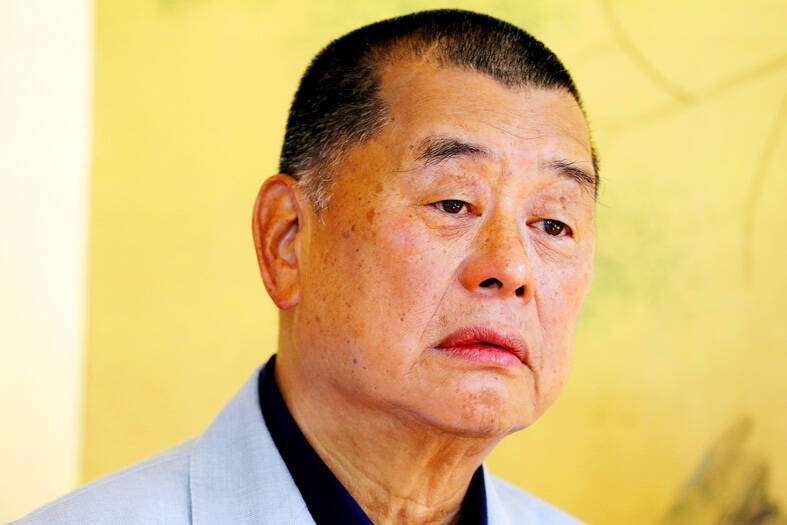Hong Kong’s top court yesterday unanimously dismissed a bid to overturn the convictions of media tycoon Jimmy Lai (黎智英) and six other democracy advocates for an unauthorized assembly in 2019.
Lai, 76, the founder of the pro-democracy newspaper Apple Daily, and six others including veteran democrat Martin Lee (李柱銘) had been found guilty of organizing and participating in an unauthorized assembly in August 2019 during months-long pro-democracy protests in the territory.
While a lower court had overturned their conviction for organizing the unauthorized assembly, their conviction for taking part in an unauthorized procession was upheld.

Photo: AP
Their appeal centered on whether the conviction was proportionate to fundamental human rights protections, a principle set down in two non-binding decisions of Britain’s Supreme Court known as “operational proportionality.”
Chief Justice Andrew Cheung (張舉能) and Judge Roberto Ribeiro wrote in the main judgement that the two UK decisions should not be followed in Hong Kong, as there are differences between the legal frameworks for human rights challenges in Hong Kong and the UK.
David Neuberger, a former head of Britain’s Supreme Court, was one of the five judges on the Court of Final Appeal (CFA) who heard the case, adding to the debate over whether foreign judges should continue to sit in the territory’s highest court amid a national security crackdown.
The judgement came two months after the resignations of two British judges from the CFA, Lawrence Collins and Jonathan Sumption.
Sumption said Hong Kong was becoming a totalitarian state and the territory’s rule of law had been “profoundly compromised.”
Neuberger in mid-June said that he would remain at Hong Kong’s highest court “to support the rule of law in Hong Kong, as best I can.”
Neuberger said he agreed with the main judgement, adding that the “issue has been fully and impressively considered,” and “gives important guidance as to the proper approach to what has been called operational proportionality.”
Neuberger added the constitutional differences in Hong Kong and the UK “do not mandate a different approach when considering whether a restriction on the right of assembly is proportionate,” but they “do require a different approach if the court concludes that the restriction is or may not be proportionate.”
Beijing imposed a National Security Law in 2020 after months of pro-democracy protests in 2019 and the Hong Kong Legislative Council passed a new national security law, known as Article 23, in March.
For organizing and taking part in an unauthorized assembly in 2019, Lai and three former lawmakers, Lee Cheuk-yan (李卓人), 67, “Long Hair” Leung Kwok-hung (梁國雄), 68, and Cyd Ho (何秀蘭), 70, were jailed between eight and 18 months. They received a reduced sentence of three to six months after their conviction for organizing was quashed.
Martin Lee, 86, a founding chairman of Hong Kong’s Democratic Party, barrister Margaret Ng (吳靄儀), 76, and veteran pro-democracy politician Albert Ho (何俊仁), 72, were given suspended sentences.

SECURITY: As China is ‘reshaping’ Hong Kong’s population, Taiwan must raise the eligibility threshold for applications from Hong Kongers, Chiu Chui-cheng said When Hong Kong and Macau citizens apply for residency in Taiwan, it would be under a new category that includes a “national security observation period,” Mainland Affairs Council (MAC) Minister Chiu Chui-cheng (邱垂正) said yesterday. President William Lai (賴清德) on March 13 announced 17 strategies to counter China’s aggression toward Taiwan, including incorporating national security considerations into the review process for residency applications from Hong Kong and Macau citizens. The situation in Hong Kong is constantly changing, Chiu said to media yesterday on the sidelines of the Taipei Technology Run hosted by the Taipei Neihu Technology Park Development Association. With

CARROT AND STICK: While unrelenting in its military threats, China attracted nearly 40,000 Taiwanese to over 400 business events last year Nearly 40,000 Taiwanese last year joined industry events in China, such as conferences and trade fairs, supported by the Chinese government, a study showed yesterday, as Beijing ramps up a charm offensive toward Taipei alongside military pressure. China has long taken a carrot-and-stick approach to Taiwan, threatening it with the prospect of military action while reaching out to those it believes are amenable to Beijing’s point of view. Taiwanese security officials are wary of what they see as Beijing’s influence campaigns to sway public opinion after Taipei and Beijing gradually resumed travel links halted by the COVID-19 pandemic, but the scale of

A US Marine Corps regiment equipped with Naval Strike Missiles (NSM) is set to participate in the upcoming Balikatan 25 exercise in the Luzon Strait, marking the system’s first-ever deployment in the Philippines. US and Philippine officials have separately confirmed that the Navy Marine Expeditionary Ship Interdiction System (NMESIS) — the mobile launch platform for the Naval Strike Missile — would take part in the joint exercise. The missiles are being deployed to “a strategic first island chain chokepoint” in the waters between Taiwan proper and the Philippines, US-based Naval News reported. “The Luzon Strait and Bashi Channel represent a critical access

Pope Francis is be laid to rest on Saturday after lying in state for three days in St Peter’s Basilica, where the faithful are expected to flock to pay their respects to history’s first Latin American pontiff. The cardinals met yesterday in the Vatican’s synod hall to chart the next steps before a conclave begins to choose Francis’ successor, as condolences poured in from around the world. According to current norms, the conclave must begin between May 5 and 10. The cardinals set the funeral for Saturday at 10am in St Peter’s Square, to be celebrated by the dean of the College